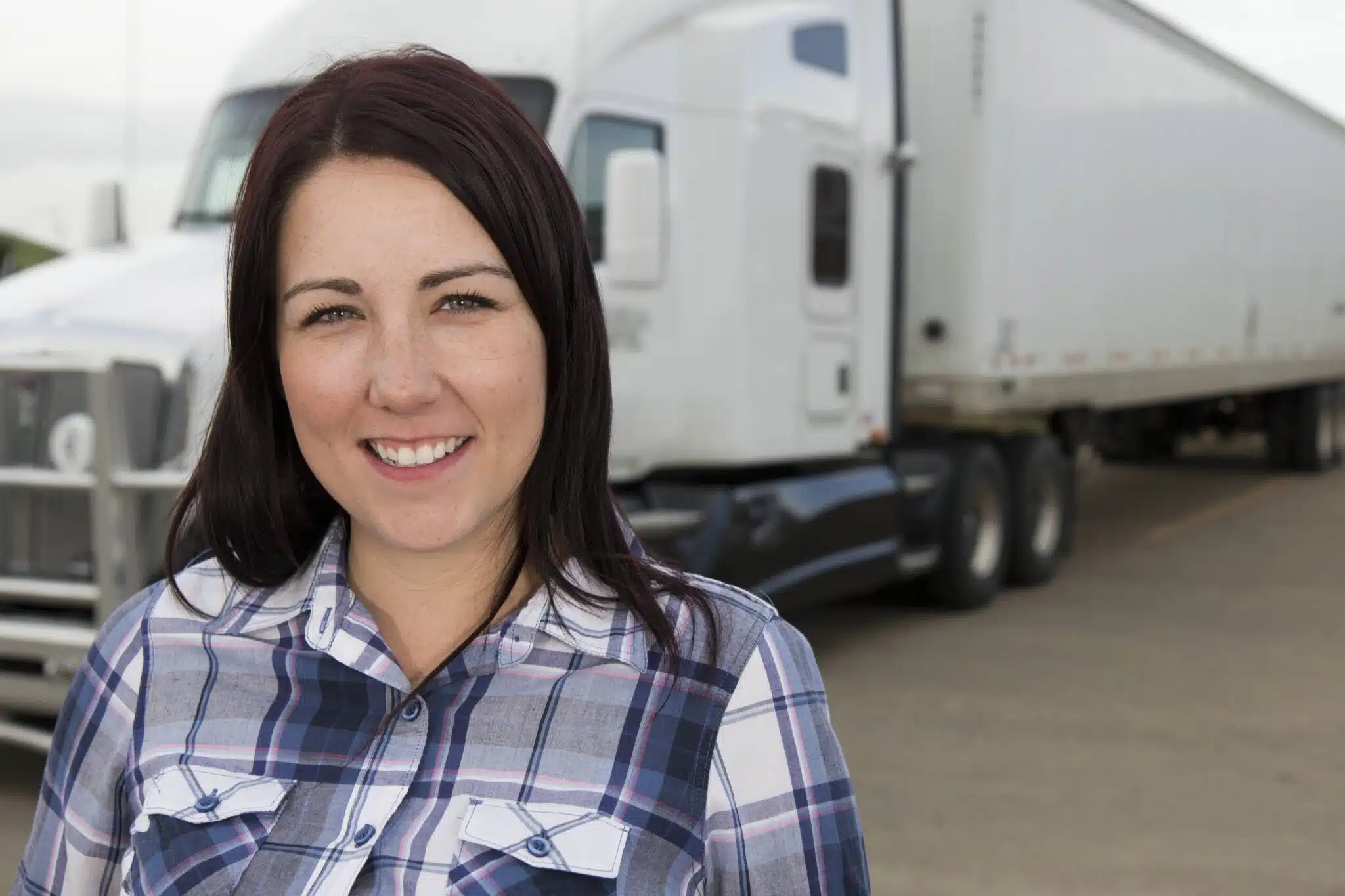Women in the Trucking Industry: Breaking Barriers and Shattering Stereotypes
The transport sector has long been a male-dominated industry, often perceiving trucking as a vocation unsuitable for women, fostering a culture resistant to change.
Yet today, paradigm shifts are underway, challenging outdated mindsets.
With each passing year, women are increasingly taking the wheel in the trucking industry, navigating through once impassable roads of gender bias and heralding a new era of diversity in logistics.
Table of Contents
ToggleThe Road Less Travelled
Historically, trucking was synonymous with grit and masculinity, an image ensconced within cultural narratives that sidelined women’s participation. Presently, intrepid women are charting a new course, emerging as both drivers and industry leaders. They’re not only mastering the rigours of long hauls but also invoking progressive changes in safety protocols, operational ethos, and equitable workplace practices. As they manoeuvre colossal road trains under the vast Australian sky, they dismantle preconceptions, embodying the spirit of innovation and resilience that is transforming the face of logistics.
Pioneering Women in Trucking
The trucking industry, once a bastion of male dominance, is witnessing a transformative surge led by tenacious women. As trailblazers, they are driving across the physical and metaphorical landscapes of a historically male-dominated realm, crafting a legacy of inclusivity and perseverance. Their journeys are punctuated by milestones that echo the evolving dynamics of the sector.
Fivefold increase in female truck licence holders over the past decade sharpens the focus on gender diversification within this critical industry. These pioneering women navigate heavy vehicles with confidence, fostering an environment that values skill and dedication above gendered stereotypes. Their presence is rewriting the narrative of trucking, serving as a beacon for future generations to follow.
Women are integral in revolutionising the traditionally male-centric trucking industry with audacity and expertise.
By championing safety initiatives and advocating for workplace equality, women in trucking are changing gears in leadership and operations. They are not only holding steering wheels but also steering committee meetings, contributing significantly to an inclusive and dynamic industry discourse. Their influence extends beyond the highway, as they become powerful voices for change within the logistics sector, reshaping industry dynamics with their unique insights and robust determination.
Diversity on the Open Road
Heavy Haulage meets Heavyweights in Inclusivity.
Dismantling the once-monolithic gender norms, women in trucking embody the transformative power of diversity. By embracing women’s contributions, the trucking industry elevates its operational efficacy. Moreover, increased female participation heralds a shift towards a more balanced industry, capable of generating innovative solutions to logistical challenges.
Women are driving change, quite literally.
In male-dominated convoys, female truckers stand out—not as anomalies but beacons. They pave the way, not merely in miles traveled but by setting benchmarks in safety, efficiency, and operational acumen, enhancing the credentials of the sector.
Inclusion fuels the engine of industry progression.
As gender diversity accelerates, the statistical landscape evolves. 2023 bears witness to an incline in female-led convoys, enriching the trucking tapestry with resilient prowess. Through mentorship and advocacy, these trailblazers create pathways for others, shaping an industry congruent with modern values of equality and opportunity.
Unpacking Industry Myths
The myth that trucking is innately a man’s domain falters under scrutiny; women have shown equal competence. This stereotype is rapidly dissipating as women’s achievements in the industry garner recognition and respect.
Contrary to traditional belief, women exhibit exemplary driving safety records and a propensity for meticulous logistics management. Their capability breaks the glass ceiling of an outdated mindset, embedding gender inclusivity into the fabric of the trucking industry.
The notion of a “man’s work” is being powerfully challenged by the surge of women in trucking, establishing a new normative in an evolving sector.
Combatting Gender Stereotypes
Embracing diversity, the trucking industry actively dismantles outdated gender biases.
-
Implementing Inclusive Policies: Championing procedures that encourage female participation.
-
Promoting Role Models: Showcasing successful women to inspire and motivate.
-
Educating Stakeholders: Informing about the benefits of gender diversity.
-
Challenging Misconceptions: Confronting and dispelling myths about women’s capabilities.
-
Providing Support Networks: Establishing mentorships and forums for women’s growth.
These initiatives are pivotal in fostering an equitable environment.
Deliberate actions are transforming the industry, making it a welcoming arena for women.
Debunking Skill Misconceptions
Contrary to dated views, physical prowess does not dictate a truck driver’s success in the industry.
Since 2005, studies have consistently demonstrated that women excel in critical trucking skills like safety, compliance, and navigation, often outperforming their male counterparts.
Moreover, advancements in vehicle technology have lessened the relevance of brute strength, placing emphasis on precision, technical know-how, and adaptability—skills where women are equally proficient.
In fact, with the aid of ergonomic designs and automated systems, the playing field is levelled, leaving no room for baseless skill-based gender biases.
Thus, it is critical to appreciate the fact that adeptness in trucking is gender-neutral, shaped more by experience and training than by gender.
Challenges Behind the Wheel
Trucking, by virtue of its demands and dynamics, presents a constellation of challenges uniquely experienced by women. Considerations such as personal safety and the search for gender-specific facilities on long-haul routes are realities that female drivers must navigate. These extend beyond the control of the steering wheel, permeating into the social fabric of their work environment.
In response to these complexities, the industry must adopt a “protective ethos.” Infrastructure that tends to the needs of women—ranging from secure parking and accommodation to respectful communication channels—is mandatory to ensure their inclusion is not mere tokenism. On the road, they encounter skepticism as to their competency, a baseless hurdle that they must persistently overcome, further establishing their right to an equal place at the helm of the transport sector.
Overcoming Workplace Obstacles
Women truck drivers often counter negative stereotypes with professionalism and competence, fostering a more inclusive atmosphere within the industry. Despite societal biases, they consistently demonstrate their proficiency and equal suitability for the profession.
Institutions are implementing mentorship programs to support women in their trucking careers. These initiatives provide invaluable guidance, building confidence and fostering growth.
Indeed, supportive networks are crucial for women truckers, offering advice and camaraderie amid male-dominated spaces. Such networks empower owners of these minority voices and facilitate the sharing of insights.
Training programs tailored to address gender-related challenges can equip women with unique tools for success. Such programs acknowledge and mitigate potential barriers, ensuring equal opportunities for advancement.
Establishing protocols that address harassment and promote equity is transforming the trucking industry. It’s vital these measures remain strictly enforced, creating a respectful and secure environment for all drivers.
Ultimately, industry leaders are realising that diversity benefits the trucking sector. Investment in equitable practices reflects a commitment to excellence and an acknowledgment of the valuable contributions of women truckers.
The Balance of Family and Career
Navigating the often-complex dynamics of family life alongside a demanding trucking profession requires adept time-management and support.
For women in the trucking industry, striking this balance often involves multifaceted planning and the leveraging of a supportive network to allow for both professional responsibilities and family commitments. Such support may come from family, childcare services, or flexible scheduling offered by employers. As career progression in trucking generally demands significant on-road time, this can add an intricate layer of complexity in managing family life.
In this context, employer flexibility becomes a linchpin for female truck drivers. By acknowledging the unique family needs of their employees and providing adaptable work arrangements, companies can retain skilled female drivers who might otherwise be forced to choose between career and family.
Employment options that include part-time work, job sharing, or family-friendly scheduling are not simply concessions; they represent an evolution in human resources strategy. They underscore an understanding that women drivers are integral to the industry’s success yet face distinct challenges needing bespoke solutions. Thus, by offering conditions that support work-life balance, employers create an atmosphere of inclusivity and demonstrate their commitment to nurturing a gender-diverse workforce.
Accelerating Change in Trucking
The trucking industry, traditionally steeped in masculine culture, is experiencing a dynamic shift as it becomes more inclusive. Spotlighting women in roles historically dominated by men not only challenges long-standing gender stereotypes but also enhances the talent pool. As society’s perception of trucking changes, the industry’s image is being progressively redefined, propelling a wave of fresh and diverse entrants.
In this era of rapid progression, mentorship programs tailored to women are vital in fostering an environment of support and growth. Such initiatives serve as a catalyst for change, amplifying the voices and experiences of women in trucking. This, along with robust policies aimed at ensuring safety and equality, helps to dismantle the barriers that have long hindered women’s participation in the field. In a tangible sense, these advancements are not just about opening doors for women, but also about enhancing the industry’s overall competence and resilience.
Policy Shifts for Inclusivity
Inclusive policies are becoming industry imperatives.
Organisational changes are essential to fostering gender inclusivity. Progressive organisations within the trucking industry are revamping their human resources policies, ensuring equal opportunities in recruitment, retention, and promotion of staff, irrespective of gender. Such reforms are set to alter the fabric of workplace dynamics, laying the groundwork for a more diverse and equitable industry. Companies that take the lead in these policy shifts cultivate a reputation for being forward-thinking and socially responsible entities.
Gender diversity must penetrate every echelon of trucking.
To this end, organisations are implementing strategic frameworks that address the unique challenges faced by women. This includes enhanced safety protocols, anti-harassment measures, and flexible working arrangements to accommodate for lifestyle needs. The focus is not merely on just recruiting women, but also on creating an environment in which they can thrive.
Insurance coverages must adapt to support inclusivity.
It is essential for insurance providers to align their products to support this evolving workforce. This includes offering insurance coverage that caters to the specific needs of women in the industry—covering aspects such as maternity leave, health concerns, and flexible working arrangements. Adoption of such tailor-made insurance solutions signals a commitment to inclusivity and substantively supports diversity in the workforce.
2023 marks a pivotal moment for regulatory conformity.
The Australian trucking sector anticipates significant regulatory shifts, reflecting the heightened focus on inclusivity. Regulatory bodies shall enforce compliance standards that bolster the rights and protections for women in trucking. This alignment between organisational intent and regulatory compliance facilitates a more inclusive landscape, substantially enriching the sphere of transport logistics.
Empowering the Next Generation
Within the trucking industry’s diverse landscape, it is pivotal to champion the empowerment of women, building a foundation that secures their involvement for generations to come, thereby creating a self-sustaining cycle of inclusion and diversity.
The mentorship offered by seasoned professionals is key to fostering success stories amongst aspiring female truckers.
Leaders within the sector must advocate policy reforms and engage in dialogues centring on undoing prevailing biases, ensuring a level playing field for all genders.
Programmes meticulously designed to educate young women about the vibrant opportunities within the logistics sector must be promoted robustly.
Scholarships and grants specifically allocated for female entrants signal a robust commitment to nurturing talent, effectively bridging the gender gap within this tradition-steeped industry.
Not only must these initiatives be sustained, but they should also evolve dynamically with the shifting tectonic plates of societal norms and industry standards to maintain relevance and efficacy.



